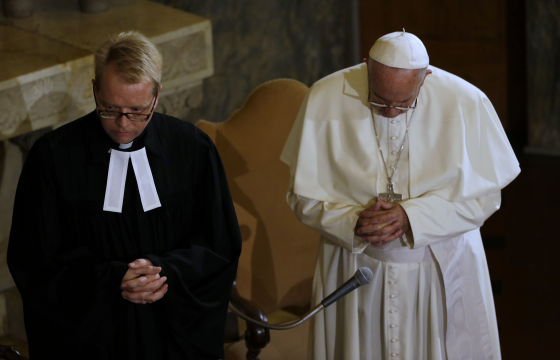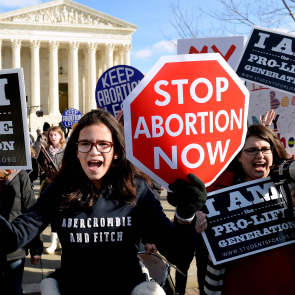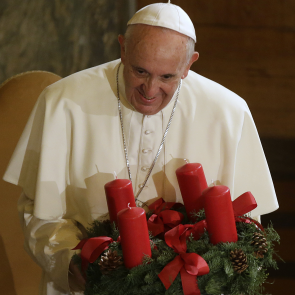In 1996 the late Cardinal Basil Hume wrote to Tony Blair, then an Anglican and on the verge of becoming Prime Minister, asking him to refrain from taking communion when he attended Mass with his family.
Blair, married to a Catholic, reluctantly agreed but in his letter of reply to the cardinal wrote: “I wonder what Jesus would have made of it.”
He was highlighting the sadness that many Christians married to Catholics feel that, despite being joined in the sacrament of matrimony, they cannot share in the sacrament of the eucharist with their spouses (except in particular circumstances.)
On Sunday a Lutheran woman in this situation addressed a question to Pope Francis when he visited the Lutheran Church on Rome on Sunday.
“We have lived together for many years, sharing joys and pains,” she said. “And therefore it hurts us very much being divided in the faith and not being able to participate together at the Lord’s Supper. What can we do to reach, finally, communion on this point?”
As we might have expected the Pope did not say “yes, go ahead” but neither did he shut down the question either. It was rather like the synod on the family’s treatment of whether divorced and remarried Catholics can receive communion: a door has been opened.
MORE NEWS, MORE ANALYSIS IN THE TABLET...
Read full analysis and comment on all the latest stories in this week’s print edition of The Tablet. To subscribe click here
In his response Francis on the one hand stressed he would “never dare give permission” but then said it is up to individual consciences to decide.
“It’s true that in a certain sense, to share means that there aren’t differences between us, that we have the same doctrine – underscoring that word, a difficult word to understand.
"But I ask myself: but don’t we have the same Baptism? If we have the same Baptism, shouldn’t we be walking together? And you’re a witness of a likewise profound journey, a journey of marriage: itself a journey of family and human love and of a shared faith, no?
"We have the same Baptism.”
He went on: “The supper? There are questions that only if one is sincere with oneself and the little theological light one has, must be responded to on one’s own. See for yourself. This is my body. This is my blood. Do it in remembrance of me – this is a viaticum that helps us to journey on.
Finally, the Pope added: “I can only respond to your question with a question: what can I do with my husband that the Lord’s Supper might accompany me on my path? It’s a problem to which everyone must respond,” he said. “a pastor-friend once told me that ‘We believe that the Lord is present there, he is present’ – you believe that the Lord is present. And what's the difference? There are explanations, interpretations, but life is bigger than explanations and interpretations.”
 Pope Francis, right, prays with Rev Jens-Martin Kruse during a visit to the Lutheran church, in Rome, on Sunday
Pope Francis, right, prays with Rev Jens-Martin Kruse during a visit to the Lutheran church, in Rome, on Sunday
It should be pointed out that there are times when non-Catholic Christians can receive communion in the Catholic Church. The 1993 ecumenical directory issued by the Vatican said it was possible for other Christians to receive the sacraments in “situations of grave and pressing need” at the discretion of the priest and according to norms of the local bishops’ conference.
The 1998 document by the Bishops of England and Wales, One Bread One Body, identified occasions of “joy and sorrow” when exceptions might be made such as a funeral or first Holy Communion. It is also the norm that Christians from other denominations marrying Catholics receive communion during their wedding nuptial mass.
There are, however, moves to a more general permission.
THE SYNOD ON THE FAMILY...
Final synod document leaves Pope room for manoeuvre - Christopher Lamb
Synod ends with no consensus on communion or homosexuality - Elena Curti
Cardinal Sarah blocked discussion of gays, says bishop - Elena Curti
The working document for last month’s synod on the family said this should be possible whenever the pastor for the non-Catholic is not available.
But during the gathering the Archbishop of Birmingham, Bernard Longley, co-Chairman of the Anglican-Roman Catholic International Commission (Arcic), issued a statement ruling this out.
He said this would “establish a category of Christians not in full communion with the Catholic Church yet distinguished from other Christians by a ‘right’ to receive Holy Communion at a Roman Catholic Mass on any occasion.”
Archbishop Longley, however, is a pastorally sensitive man who said he hoped that the current exceptions that allow non-Catholics to receive the sacraments become better known. He has also hinted in the past that greater exceptions might be made.
In an interview with the Church of Ireland Gazette in 2013 the archbishop said he “could imagine and foresee one of the fruits of our ecumenical engagement as moving towards a deeper understanding of communion and a deeper sharing between our churches.”
And with Pope Francis, this looks more possible than ever before.
KEEP UP TO DATE ON TWITTER AND FACEBOOK...
Follow all the latest news and events from the Catholic world via The Tablet's Twitter feed @the_tablet
Or you can join in the debate at our community page on Facebook




 Loading ...
Loading ...
What do you think?
You can post as a subscriber user ...
User comments (7)
My enduring prayer is that the Blessed Sacrament of the Eucharist may become a symbol of inclusion rather than exclusion.
"I believe in the Real Presence, and as far as "Body, Blood, Soul and Divinity" go, while it's not my language, I have no objection to it."
JCF may I ask, if you believe these things why are you not a Catholic?
Our pastor recently said before eucharist during a funeral mass that "anyone who believes the bread and wine to be the actual body and blood of Jesus would be welcome to partake".
Yes, we have the same Baptism which is enough to enable us to share in Communion/Eucharist at the same table.
As the Pope says here: ‘We believe that the Lord is present there, he is present’ – you believe that the Lord is present.
And what's the difference?
There are explanations, interpretations, but life is bigger than explanations and interpretations.” So too is God bigger than human explanations, interpretations: beyond human imagining we say.
Therefore all persons, baptised or not, who seek a deeper relationship with God through Christ, should be welcome at Christ’s table.
I'm a non-Roman Catholic Christian who's received RC communion on more than one occasion, and MY conscience is clear! [I believe in the Real Presence, and as far as "Body, Blood, Soul and Divinity" go, while it's not my language, I have no objection to it.]
Most importantly, it's CHRIST's table, not any particular bishop's! (inc the Bishop of Rome)
Lucky for me, I wasn't "on the verge of becoming Prime Minister". and thus created no visible "scandal"...
Orientalium Ecclesiarum in fact allows non-Catholic Eastern Christians to receive the Eucharist:
27. Without prejudice to the principles noted earlier, Eastern Christians who are in fact separated in good faith from the Catholic Church, if they ask of their own accord and have the right dispositions, may be admitted to the sacraments of Penance, the Eucharist and the Anointing of the Sick. Further, Catholics may ask for these same sacraments from those non-Catholic ministers whose churches possess valid sacraments, as often as necessity or a genuine spiritual benefit recommends such a course and access to a Catholic priest is physically or morally impossible.
28. Further, given the same principles, common participation by Catholics with their Eastern separated brethren in sacred functions, things and places is allowed for a just cause.
29. This conciliatory policy with regard to communicatio in sacris (participation in things sacred) with the brethren of the separated Eastern Churches is put into the care and control of the local hierarchs, in order that, by combined counsel among themselves and, if need be, after consultation also with the hierarchs of the separated churches, they may by timely and effective regulations and norms direct the relations among Christians.
Source: http://www.vatican.va/archive/hist_councils/ii_vatican_council/documents/vat-ii_decree_19641121_orientalium-ecclesiarum_en.html
I venture a guess that many Catholics would not pass an orthodoxy test if they were questioned about communion/the Eucharist in order to continue to be able to receive it.